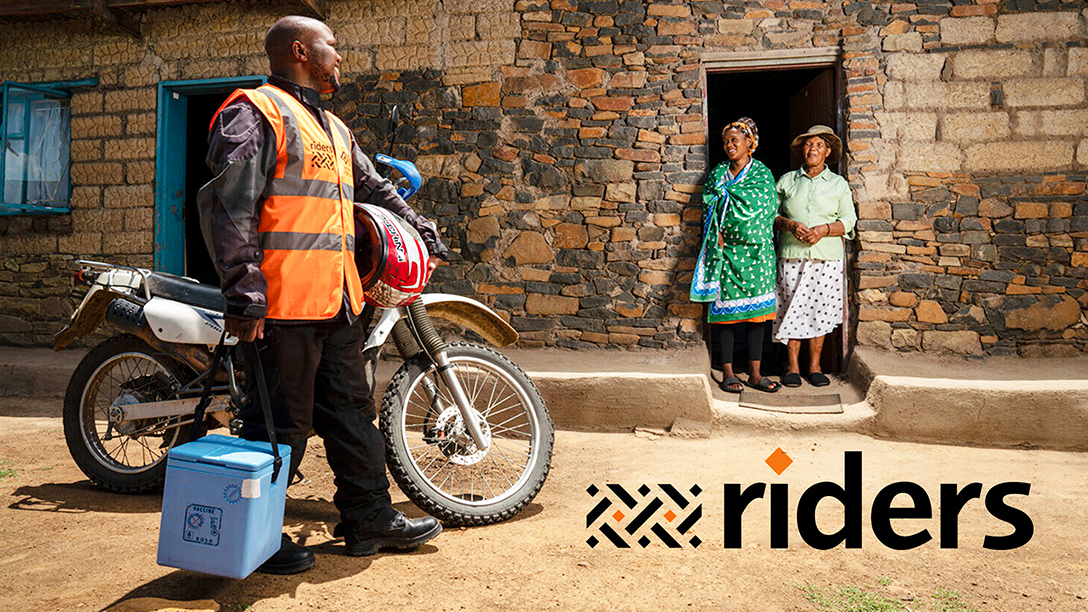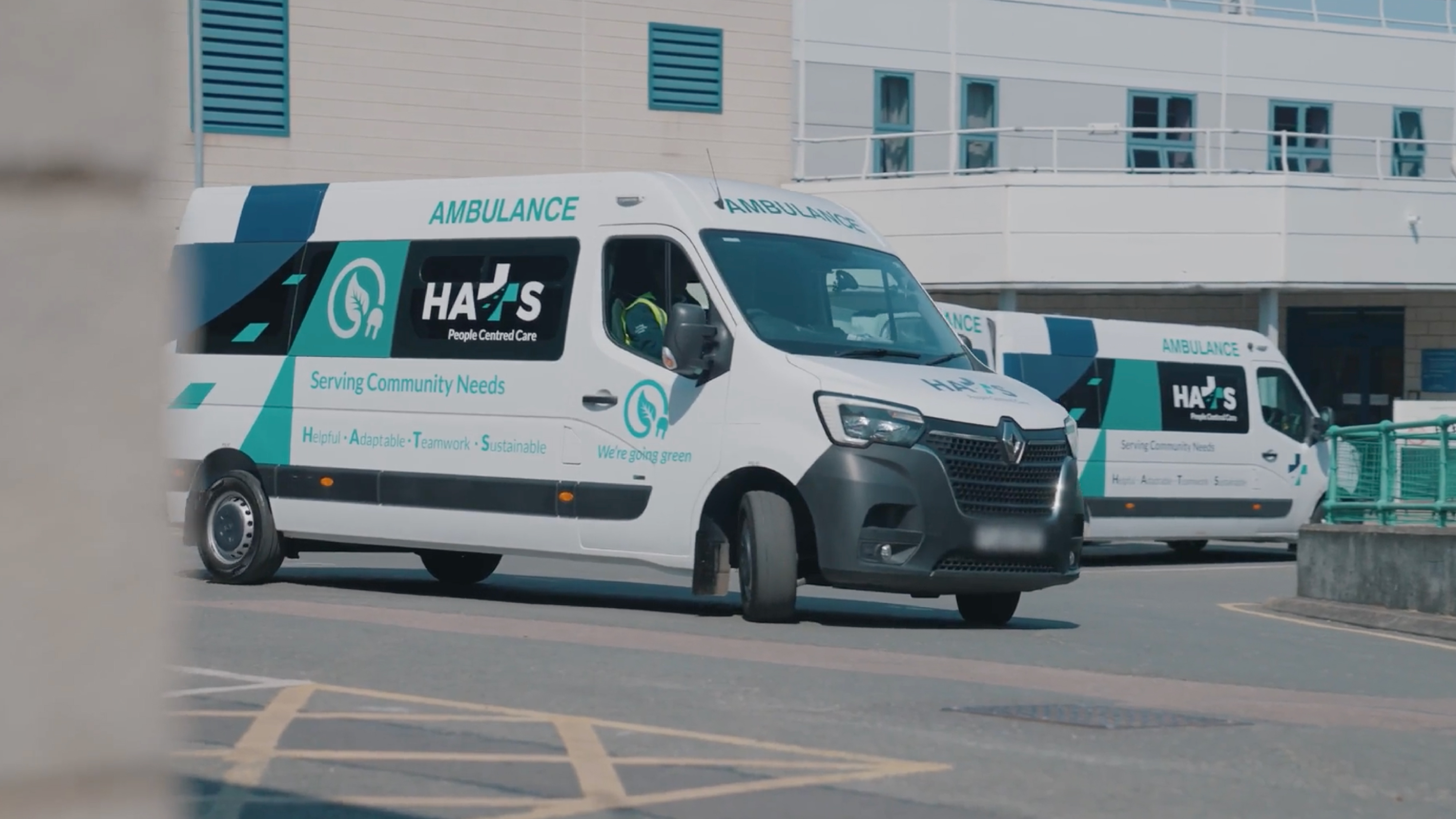
Riders for Health: Delivering critical healthcare support

Table of contents
- The challenge: Reaching more people and keeping riders and drivers safe in extreme and unpredictable conditions
- The solution: Geotab keeps drivers safe and remote communities connected to critical healthcare support
- The results: Geotab solutions are strengthening Riders' fleet reliability and its impact on health system performance
- Riders looks forwards to expanding the use of Geotab solutions to reach new heights in healthcare
- From the Customer
Riders for Health (Riders) is an African social enterprise and world leader in managing and maintaining vehicles for health-focused organisations. Their vision is to create a world in which healthcare reaches everyone, everywhere. They do this by ensuring that reliable transport is available for ministries of health and health-focused non-governmental agencies.
Riders has acquired a wealth of experience working in 12 sub-Saharan African countries for more than 30 years. Now operating in Malawi, Nigeria, The Gambia and Lesotho, their operations include fleet management, outreach healthcare, sample transport, emergency health transport, medical supply chain logistics, and rider and driver training.
They have been successful in reducing turn-around times for patient test results, and have been instrumental in supporting tuberculosis (TB) and HIV reduction initiatives.
In Lesotho, they've achieved these results by using award-winning maintenance systems to manage fleets of motorcycles and 4x4 vehicles. This means they can be reliably used in very high and sub-zero temperatures, on rough mountainous terrain, and in harsh and unpredictable conditions.
The challenge: Reaching more people and keeping riders and drivers safe in extreme and unpredictable conditions
Lesotho, a high-altitude, landlocked kingdom encircled by South Africa, is criss-crossed by a network of rivers and mountain ranges, including the 3482m-high peak of Thabana Ntlenyana. It has a base altitude of 1400m — the "highest lowest point" of any country.
In contrast to its natural beauty, the health of the nation is not a pretty picture. There are significant health issues, including high numbers of HIV/AIDS and TB cases.
Over 70% of Lesotho's 2.3 million population live in rural areas where road networks are challenging and often non-existent. Riders mobilises over 100 health professionals—including nurses, sample couriers, environmental and public health specialists—across Lesotho's ten districts to deliver healthcare to isolated communities.
Employees predominantly travel alone to these communities and have limited contact with the office in the capital of Maseru, so safety, communication and data sharing are primary concerns.
Simon Devine, Research, Development and Digital Lead for Riders, says that prior to implementing Geotab tracking solutions, drivers and riders relied on local knowledge for planning routes, estimating timing and anticipating incidents that might cause them to have to reroute.
They were also using a paper-based system to collect information about trips, maintenance and fuel, which left too much room for error and required considerable time to collect. Paper forms could take six weeks to be returned and entered into the system.
The solution: Geotab keeps drivers safe and remote communities connected to critical healthcare support
Riders for Health provides transport services to remote villages where communication is limited and managing rider/driver safety and tracking vehicle movements is challenging. They needed a reliable solution to meet these specific needs.
Devine says they had "dabbled" in using telematics previously, but this was the first time they deployed devices across the entire fleet. "I think if you're going to do it, you need to do the whole thing. We needed to do it big so we could collect data on everything we're doing."
They worked with Geotab to install 100 GO RUGGED devices, adapters and harnesses on their motorcycles and utility vehicles. They also introduced monitoring software to begin collecting and analysing data.
Reach more people safely and quickly
Riders employees are often transporting infectious substances such as samples of HIV, tuberculosis and COVID on their own. It is vitally important that the organisation knows where they are at all times.
The organisation relies on route optimisation to keep riders and drivers safe, reach more people in a day and spend more time in communities when needed.
On top of keeping individual drivers and riders safe, Devine says that managing their routes and the speed at which they are travelling benefits the wider community. "If we can ensure the health worker gets from point A to point B, and the sample transporter returns with a sample as quickly and safely as possible, then we can put a patient on to treatment faster."
Enhance effectiveness and efficiency and measure impact
Riders relies on Geotab solutions and software for:
- Overall fleet management
- Route optimisation
- Collecting data on health activities
- Managing vehicle replacement parts, fleet maintenance and servicing
- Tracking fuel consumption and idling
"Being able to count kilometres is basic but it informs so many things. We know the distance travelled by the health workers and the use each vehicle gets, so we can move vehicles around as needed", says Devine.
Manage environmental footprint and costs
As a social enterprise, Riders is very committed to managing its environmental footprint and keeping costs down. "We are working with budgets that are very tight, so reducing idling and keeping fuel costs down is very important", explains Devine.
The results: Geotab solutions are strengthening Riders' fleet reliability and its impact on health system performance
It's been just over a year since Riders completed the installation of the devices in all of its fleet vehicles, and they are already starting to see how powerful this technology can be.
Increasing staff safety in remote locations
Being able to monitor vehicle movements in real time has come as a great relief for both the riders/drivers and office staff. Information accessed from the MyGeotab dashboard, such as speed monitoring and use of seat belts, is now included in staff briefings and training.
Devine says that, while they have always had a good reputation and employee retention is strong, the telematics devices have further enhanced the employee experience. "Knowing that, if there is any problem, you don't have to rely on a phone or get to the next village, someone will come to you, is a huge morale boost."
Strengthening health systems
In 2009, Riders for Health started a five-year study in collaboration with Stanford University to assess the organisation's impact. Devine says that the gains made from using Geotab solutions further strengthen three key areas identified in the study.
- Health – Fleet management can contribute to stronger health system performance. Depending on the type of health worker mobilised, this could ultimately impact health outcomes such as preventable childhood illnesses like measles, childhood mortality, unattended deliveries in rural villages and maternal mortality.
- Community – In communities where Riders operates, there is "perceived improved health system performance" compared to where they had no presence. A belief in a health system that works, is reliable and predictable, particularly by marginalised groups and communities, is essential in gaining the communities' confidence in accessing primary care and life-saving treatments.
- Fleet – Using a systematic fleet management programme can increase the amount of health services delivered. Optimising Riders' award-winning fleet maintenance systems with Geotab devices and monitoring software will help improve vehicle reliability and minimise inefficient fuel use and emissions.
Fortifying relationships with partners
Devine says demonstrating that Riders is an innovative and forward-thinking organisation that works with trusted organisations, such as Geotab, is essential in forging and maintaining relationships with partner organisations.
"It shows the Ministry of Health, government organisations and non-governmental organisations that we are a good partner, and we are always looking for ways to improve for our organisation and others."
Riders looks forwards to expanding the use of Geotab solutions to reach new heights in healthcare
Riders has worked closely with Geotab throughout the process, particularly when they first installed the devices. “Geotab couldn't have been more helpful — on calls and by providing training sessions. As a social enterprise, we rely on donations and contract work, and paying for a specialist team of this calibre would be exceptional spending for us.”
Due to the success of the Lesotho partnership, Riders for Health has carried out pilot studies in Nigeria and Malawi using the Geotab solution, and hopes to expand use to all vehicles in these countries and in The Gambia with the continued support of Geotab.
From the Customer
“Geotab is a scalable platform that takes the complexity out of collecting data and transforms it into useful information so you can make the right decisions in real time. Exactly what Riders for Health was looking for.”
Simon Devine, Research, Development and Digital Lead, Riders for Health
Client profile
Client name:
Riders for Health Lesotho
Industry:
Public Health
Types of vehicles:
Motorcycles and SUVs
Fleet size:
113
Other stories
%20(1)%20(1).jpg)
Tarmac achieves a safer, more sustainable, data-driven fleet via Motormax and Geotab's solution
April 8, 2025
.png)
Moove Cars optimises its fleet with Geotab technology, saving over £3,000,000 per year
February 26, 2025

HATS Group: Reducing fleet risk with insights from Geotab’s camera-based telematics solution
February 20, 2025

United Utilities: Improved fleet sustainability, driver safety, and vehicle availability
September 20, 2024
